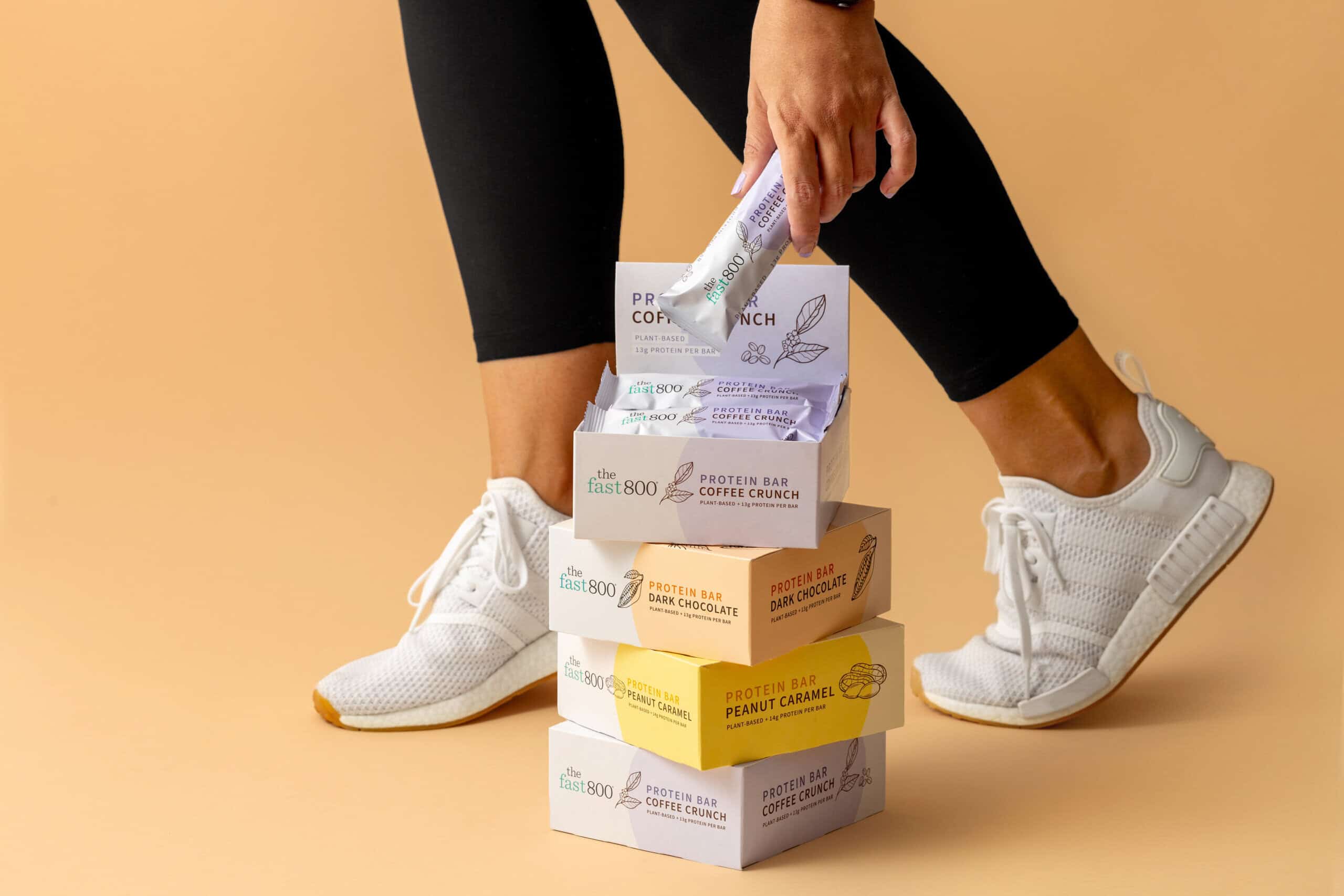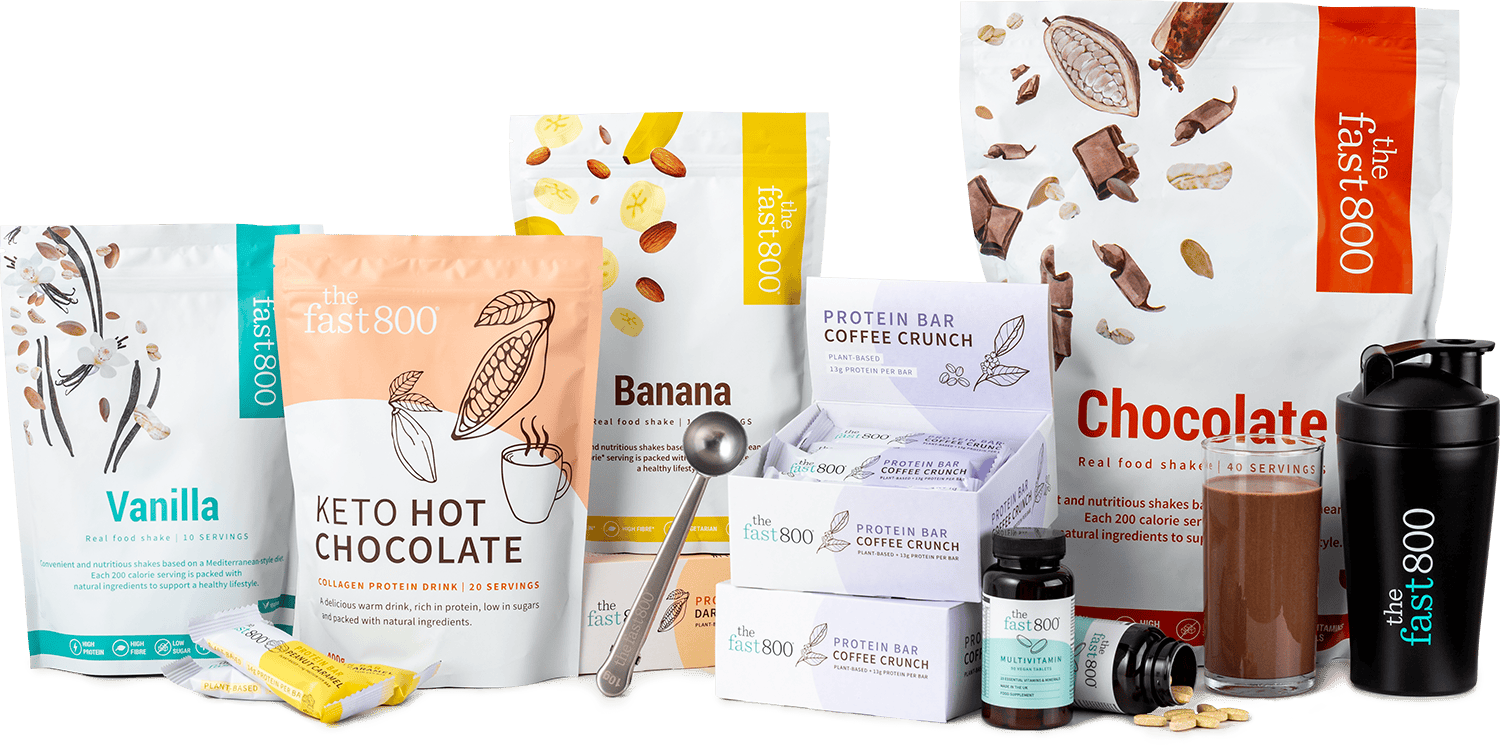Our Top 10 High Protein Foods
Protein is a macronutrient that we need to eat in large amounts to provide us with essential calories and energy. Unlike carbohydrates and fat, our body can’t store protein so we need to ensure we’re eating at least 60g of protein per day to stay nourished.
Benefits of protein
Eating high protein foods provides many health benefits, including maintaining good bone health, lowering blood pressure, lowering the risk of osteoporosis, reducing the risk of cardiovascular disease, and speeding up injury recovery.1,2,3,4,5
Additionally, protein is at the heart of healthy weight loss. It increases satiety and decreases hunger, while maintaining muscle mass and helping prevent weight regain.6,7,8 Eating high protein foods also improves thermogenesis and sleeping metabolic rate, both of which lead to calorie burning while you sleep.9,10
Our top 10 high protein foods
The Fast 800 Programme has over 800 low carb, high protein Mediterranean-style recipes to aid weight loss and to keep you satisfied while being at your healthiest. Every meal plan has been created by our in-house nutritionist to ensure you’re reaching our recommended 60g of protein per day. However, if you’re putting together your own meal plans each week, here are some high protein foods to help you reach your daily protein goals.
1. Eggs
You may already know that eggs are a fantastic source of protein, but did you know that eating just two eggs contains around 12g of protein and up to 30% of the daily vitamin requirements for humans?11 That’s a lot to pack into such a small bundle.
Egg whites are almost pure protein, while the yolk contains healthy fats and many more nutrients so there are benefits of eating both. Scramble them, poach them, incorporate them into other dishes, top soups with them, or even just eat a hard boiled egg as an on-the-go boost: they really are one of the most versatile high protein foods.
2. Greek Yogurt
We’re big fans of Greek yogurt; it’s high in protein, nutritious and delicious, what’s not to love? Containing vitamin B12, vitamin A, zinc, selenium and calcium, a 200g (7oz) serving provides almost 12g of protein – with some brands boasting more. We always encourage our community to enjoy full-fat yogurt (as opposed to the 0% or low-fat versions) as it’s more delicious, more satiating and far more natural!
If you have a sweet tooth, this Protein Mug Cake is topped with Greek yogurt and contains almost 30g of protein!
3. Nuts
Nuts are great sources of protein and healthy fats – top dishes with them, or eat a handful alongside a meal to keep you fuller for longer.
A handful of almonds contains around 6g protein, similarly to pistachios, cashews and walnuts.
Eating nuts has also been shown to lower heart disease risk factors like high cholesterol and high blood pressure.12
4. Tofu
Tofu is condensed soy milk, pressed into blocks of different firmness often used to provide a protein-packed meat alternative in meals.
A 100g (3.5oz) serving of tofu contains around 120 calories and 12g protein, as well as iron, amino acids, zinc, vitamins and minerals.
If you’re new to cooking tofu, this gut-friendly Kimchi Tofu Rice Bowl includes a step-by-step of how to prepare and enjoy it.
5. Lentils
Lentils are one of the richest sources of plant-based protein, which means they’re an excellent high protein food, particularly for vegetarians and vegans.
Their high protein content, among other nutrients like fibre, folate, magnesium, iron and potassium, means they’re a nutritional powerhouse and have been shown to lower the risk of developing fatty liver and heart disease.
This Sweet Potato and Lentil Soup is sure to turn you into a lentil lover.
6. Protein powder and protein bars
Protein powder is a popular supplement among athletes and fitness fanatics due to its high protein content and consequent ability to increase muscle mass and injury repair. Protein Powder is commonly available in whey or pea versions, the latter being suitable for those following a plant-based diet.
Shakes and protein bars can be a great option to add to your diet for a quick protein boost. The Fast 800 Protein Shakes and Protein Bars are an ideal and convenient option to increase your daily protein intake and are really useful on days when you’re too busy to prepare a nutritious meal. Just one serving of our delicious shakes contains over a third of your 60g protein recommendation.
Note – The Protein Powder is available in the UK, Australia and New Zealand and the Protein Bars are currently available in the UK only.
7. Fish and shellfish
Shellfish, such as shrimp/prawns, oysters, scallops and clams are high protein foods, and contain healthy fats and a whole host of vitamins and minerals. For example, one 85g (3oz) serving of smoked mussels provides around 17g of protein.
Oily fish, like salmon or mackerel, are high in protein and healthy fats, among many other important nutrients. Half a salmon fillet (around 124g) provides 27g of protein, and 100g (3.5oz) of tinned tuna provides around 23g of protein.
This Grilled Spicy Salmon with Avocado Salsa recipe is a favourite in our community, particularly great for those following two-meal-a-day plans, with 32g protein and just 520 calories per portion.
8. Broccoli
It might surprise you to learn that broccoli is high in protein compared with other vegetables. While it isn’t enough to eat as your sole protein source, choosing this green over other veggies may help to boost your daily intake.
One hundred grams of raw broccoli has 4.7g of protein, as well as folate and potassium, and is just 31 calories.
This Salmon and Broccoli Pesto Poké Bowl recipe packs a protein punch with salmon, cottage cheese and broccoli which are all filling high protein foods, while this Keto Broccoli, Ginger and Coriander Soup (8.4g protein) is the perfect vegetarian light lunch.
9. Lean meat
Chicken and beef are among the more well-known high protein foods. Though beef is rich in protein, iron, vitamin B-12 and B6, it can also be high in fat so it’s important to choose lean beef wherever possible to limit your intake of saturated fats for optimal heart health.
A 100g skinless chicken breast provides roughly 22g of protein, while a 100g serving of ground beef contains around 23g of protein.
This Beef Stir Fry is just 307 calories per serving and provides 40.9g of protein. If chicken is more your thing, this Mediterranean Mozzarella Chicken at 36.8g might be more up your street.
10. Cottage Cheese
Similar to Greek yogurt, this cheese is rich in protein, calcium, phosphorus, and various vitamins and minerals.
One cup (around 226g) of cottage cheese contains around 34.6g of protein, so whether you’re a vegetarian, on a keto diet, or just love cheese, this is an excellent way to get yourself up to that 60g protein target.
This versatile high protein food can be enjoyed as part of a savoury dish or a sweet treat. Our Strawberry Thick Shake contains 100g of cottage cheese bringing it up to a whopping 20g protein for just one shake, whereas adding cottage cheese as a creamy side, or using it as a dip for raw veggies, is always a winner.
Final take away
Whether you’re looking to lose weight, or are just aiming for generally optimal health, it’s vital to eat enough protein, and with these foods you can’t go too far wrong.
However, we know there are often days when you don’t have the time to cook a nutritious meal, and that calculating protein into a calorie-controlled meal plan can often be extra work. This is why we created The Fast 800 Protein Shakes and Bars so you can always have a healthy source of protein at your fingertips wherever you are, either in place of a meal or for a little extra protein boost.
Bonjour JP. Dietary protein: an essential nutrient for bone health. J Am Coll Nutr. 2005 Dec;24(6 Suppl):526S-36S. doi: 10.1080/07315724.2005.10719501. PMID: 16373952.
Altorf-van der Kuil W, et al. Dietary protein and blood pressure: a systematic review. PLoS One. 2010 Aug 11;5(8):e12102. doi: 10.1371/journal.pone.0012102. PMID: 20711407; PMCID: PMC2920332.
Hannan, M.T., et al (2000), Effect of Dietary Protein on Bone Loss in Elderly Men and Women: The Framingham Osteoporosis Study. J Bone Miner Res, 15: 2504-2512. https://doi.org/10.1359/jbmr.2000.15.12.2504
Appel LJ, et al. Effects of Protein, Monounsaturated Fat, and Carbohydrate Intake on Blood Pressure and Serum Lipids: Results of the OmniHeart Randomized Trial. JAMA. 2005;294(19):2455–2464. doi:10.1001/jama.294.19.2455
Russell L. The importance of patients’ nutritional status in wound healing. Br J Nurs. 2001 Mar;10(6 Suppl):S42, S44-9. doi: 10.12968/bjon.2001.10.Sup1.5336. PMID: 12070399.
Blom WA, et al. Effect of a high-protein breakfast on the postprandial ghrelin response. Am J Clin Nutr. 2006 Feb;83(2):211-20. doi: 10.1093/ajcn/83.2.211. PMID: 16469977.
Cava E, Yeat NC, Mittendorfer B. Preserving Healthy Muscle during Weight Loss. Adv Nutr. 2017 May 15;8(3):511-519. doi: 10.3945/an.116.014506. PMID: 28507015; PMCID: PMC5421125.
Westerterp-Plantenga MS, et al. High protein intake sustains weight maintenance after body weight loss in humans. Int J Obes Relat Metab Disord. 2004 Jan;28(1):57-64. doi: 10.1038/sj.ijo.0802461. PMID: 14710168.
Bray GA, et al. Effect of protein overfeeding on energy expenditure measured in a metabolic chamber. Am J Clin Nutr. 2015 Mar;101(3):496-505. doi: 10.3945/ajcn.114.091769. Epub 2015 Jan 14. PMID: 25733634.
Lejeune MP, et al. Ghrelin and glucagon-like peptide 1 concentrations, 24-h satiety, and energy and substrate metabolism during a high-protein diet and measured in a respiration chamber. Am J Clin Nutr. 2006 Jan;83(1):89-94. doi: 10.1093/ajcn/83.1.89. PMID: 16400055.
Réhault-Godbert S, Guyot N, Nys Y. The Golden Egg: Nutritional Value, Bioactivities, and Emerging Benefits for Human Health. Nutrients. 2019 Mar 22;11(3):684. doi: 10.3390/nu11030684. PMID: 30909449; PMCID: PMC6470839.
Kalita S, Khandelwal S, Madan J, Pandya H, Sesikeran B, Krishnaswamy K. Almonds and Cardiovascular Health: A Review. Nutrients. 2018 Apr 11;10(4):468. doi: 10.3390/nu10040468. PMID: 29641440; PMCID: PMC5946253.
Bahrami A, Teymoori F, Eslamparast T, Sohrab G, Hejazi E, Poustchi H, Hekmatdoost A. Legume intake and risk of nonalcoholic fatty liver disease. Indian J Gastroenterol. 2019 Feb;38(1):55-60. doi: 10.1007/s12664-019-00937-8. Epub 2019 Feb 22. PMID: 30796701.
Bahrami A, Teymoori F, Eslamparast T, Sohrab G, Hejazi E, Poustchi H, Hekmatdoost A. Legume intake and risk of nonalcoholic fatty liver disease. Indian J Gastroenterol. 2019 Feb;38(1):55-60. doi: 10.1007/s12664-019-00937-8. Epub 2019 Feb 22. PMID: 30796701.











